银纳米线柔性透明导电薄膜及暖屏的设计与制备毕业论文
2020-06-14 16:30:53
摘 要
导电薄膜在光电子与微电子等领域有广泛应用,诸如薄膜加热器、信息显示、信息存储、能源转换、生物电子等器件。随着电子器件智能化的快速发展,人们对未来移动终端、可穿戴设备、智能家电等产品有着强劲的需求,诸如冬天行驶中的汽车快速的给玻璃除雾、窗户或者建筑的透明玻璃给室内升温、高透明可加热显示屏等。实现这些智能化需要一种透明导电薄膜加热器。当前,ITO膜已被广泛使用的一种透明的加热器,但它不仅表现出缓慢的热响应也需要复杂的制造过程,且稀土金属日趋匮乏,造成价格日趋昂贵。开发原材料丰、价格低廉、柔韧性好的电子材料与薄膜加热器件具有重要意义。本论文主要讨论了银纳米线在功能薄膜领域的应用,重点探索银纳米线在智能暖屏与柔性透明存储器领域的应用。主要研究内容和结果如下:
- 高性能银纳米线与氧化石墨烯复合薄膜暖屏的制备与表征。研究银纳米线与氧化石墨烯的复合方式、层数、厚度、电压、氙灯照射对暖屏加热效果及稳定性的影响。结果显示:银纳米线与氧化石墨烯的厚度越厚层数越多耐受电压越高,稳定性越好。复合薄膜的加热效果及稳定性测试的最佳施加电压为5V,复合薄膜最高加热温度高达90℃,氙灯照射前后复合薄膜最高加热温度分别为84.9℃与98℃。研究表明,利用氙灯对复合薄膜进行照射,增强了银纳米线结与结之间的粘结力,提高了复合薄膜暖屏的热电性及稳定性。
- 高性能银纳米线柔性透明存储器的制备与表征。我们成功制备出以NOA63作为柔性衬底的Ag NW/PVP:Ag NP/Ag NW三明治结构柔性透明存储器,发现其具有很低的转变电压和多段存储的特性,该柔性透明存储器的电流-电压曲线表现出电学双稳态,器件呈现一次写入多次读取(WORM)存储功能。
关键词:银纳米线 氧化石墨烯 柔性透明存储器 薄膜暖屏
ABSTRACT
Conductive thin films were widely used in optoelectronics and microelectronics, such as thin film heaters, information display, information storage, energy conversion, bioelectronics and other devices. With the rapid development of electronic devices, people on the future of mobile terminals, wearable equipment, smart home appliances and other products had a strong demand, such as the winter driving the car quickly to the glass defogging, windows or architectural transparent glass to the interior Heating, high transparency, and so on. The realization of these intelligent needed a transparent conductive film heater. At present, ITO films had been widely used as a transparent heater, but it not only showed a slow thermal response also requires complex manufacturing processes, and rare earth metals were increasingly scarce, resulting in increasingly expensive prices.Developing rich raw materials, low price, good flexibility of electronic materials and film heater were of great significance. This paper, the application of silver nanowires in the field of functional thin films was mainly discussed. The application of silver nanowires in intelligent warm screen and flexible transparent memory was mainly discussed. The main contents and results are as follows:
- Preparation and characterization of high-performance silver nanowires and graphene oxide film.We studied that how composite mode, number of layers, thickness, voltage, xenon lamp irradiation of silver nanowires and graphene oxide affects the heating effect and stability of the warm screen.The results show that the film with higher the thickness of silver nanowires and graphene oxide had the higher the tolerance voltage and the better the stability. Composite film heating effect and stability of the best test voltage applied to 5V, composite film maximum heating temperature up to 90 ℃,The maximum heating temperature of composite film before and after xenon lamp irradiation was 84.9 ℃ and 98 ℃. The results show that the xenon lamp irradiated the composite film, which enhanced the bonding force between the silver nanowire junction and the junction, and improved the thermoelectricity and stability of the composite film warm screen.
- Preparation and Characterization of High Performance Silver Nanowire Flexible Transparent Memory. We successfully fabricated Ag NW / PVP: Ag NP / Ag NW sandwich structure Flexible Transparent Memory with NOA63 as a flexible substrate , and found that it has a very low conversion voltage and multi-segment storage characteristics, The current-voltage curve of the flexible transparent memory exhibited electrical bistability, The device presented a write-once multiple read (WORM) storage function.
KEY WORDS: Silver nanowires;Graphene Oxide;Flexible Transparent memory device;Hybrid film warm screen.
目 录
摘 要 I
ABSTRACT II
第一章 绪论 1
1.1 引言 1
1.2 银纳米线薄膜的制备方法 1
1.2.1 喷涂法 1
1.2.2 旋转涂布法 2
1.2.3 卷对卷 3
1.3 银纳米线薄膜的应用 3
1.3.1 柔性透明薄膜加热器 4
1.3.2 柔性透明存储器 4
1.4 本文研究内容和创新点 4
第二章 高性能银纳米线与氧化石墨烯复合薄膜暖屏的制备与表征 6
2.1 引言 6
2.2 实验材料 6
2.3 实验仪器 7
2.4 实验方案 7
2.4.1 实验步骤 7
2.4.2 表征方法 8
2.5 结果与讨论 8
2.5.1 氧化石墨烯与银纳米线复合方式对加热性能的影响 8
2.5.2 银纳米线与氧化石墨烯厚度对薄膜加热器性能的影响 9
2.5.3 银纳米线与氧化石墨烯层数对加热性能的影响 10
2.5.4 电压对加热温度的影响 11
2.5.5 薄膜暖屏热成像显示 12
2.6 结论 13
第三章 柔性透明存储器的制备与表征 14
3.1 引言 14
3.2 实验材料 15
3.3 实验仪器 15
3.4 实验方案 16
3.5 结果与分析 17
3.6 结论 18
第四章 总结 19
参考文献 20
致谢 22
第一章 绪论
1.1 引言
随着消费体验的升级和消费者对个性化穿戴及产品体验要求的提升,智能硬件将不可避免的具有柔性透明可穿戴等属性。柔性透明导电电极是各种光电子器件不可缺少的一部分,作为柔性电子屏幕必备的电极材料将会取得飞速的发展[1]。当前,透明导电电极最常用的导电材料为铟锡氧化物(ITO)[2]。然而,稀土金属铟的逐渐匮乏,其价格日趋昂贵,同时,ITO导电玻璃因为自身的脆性等缺点无法满足未来柔性可穿戴的基本要求[3]。随着柔性电子的快速发展,人们对柔性显示、智能家电、可穿戴设备等产品有着强劲的需求,开发原材料丰、价格低廉、柔韧性好的电子材料与薄膜器件具有重要意义[4]。
目前,替代ITO导电玻璃的技术主要有石墨烯、导电聚合物、纳米碳管、金属网格、纳米银线等技术[5]。理论上,石墨烯具有良好的透明度及导电性,但是,其制备流程繁琐复杂,价格较高且不易大规模量产[6]。碳纳米管虽然具有良好的柔韧性,然而相对于ITO导电薄膜,其光电性能较差[7]。尽管金属网格具有导电性佳且成本低的优势,但是金属网格直径较大、材料易被氧化、金属易反射、金属线易断裂等问题都让金属网格技术备受考验[8]。
相关图片展示:
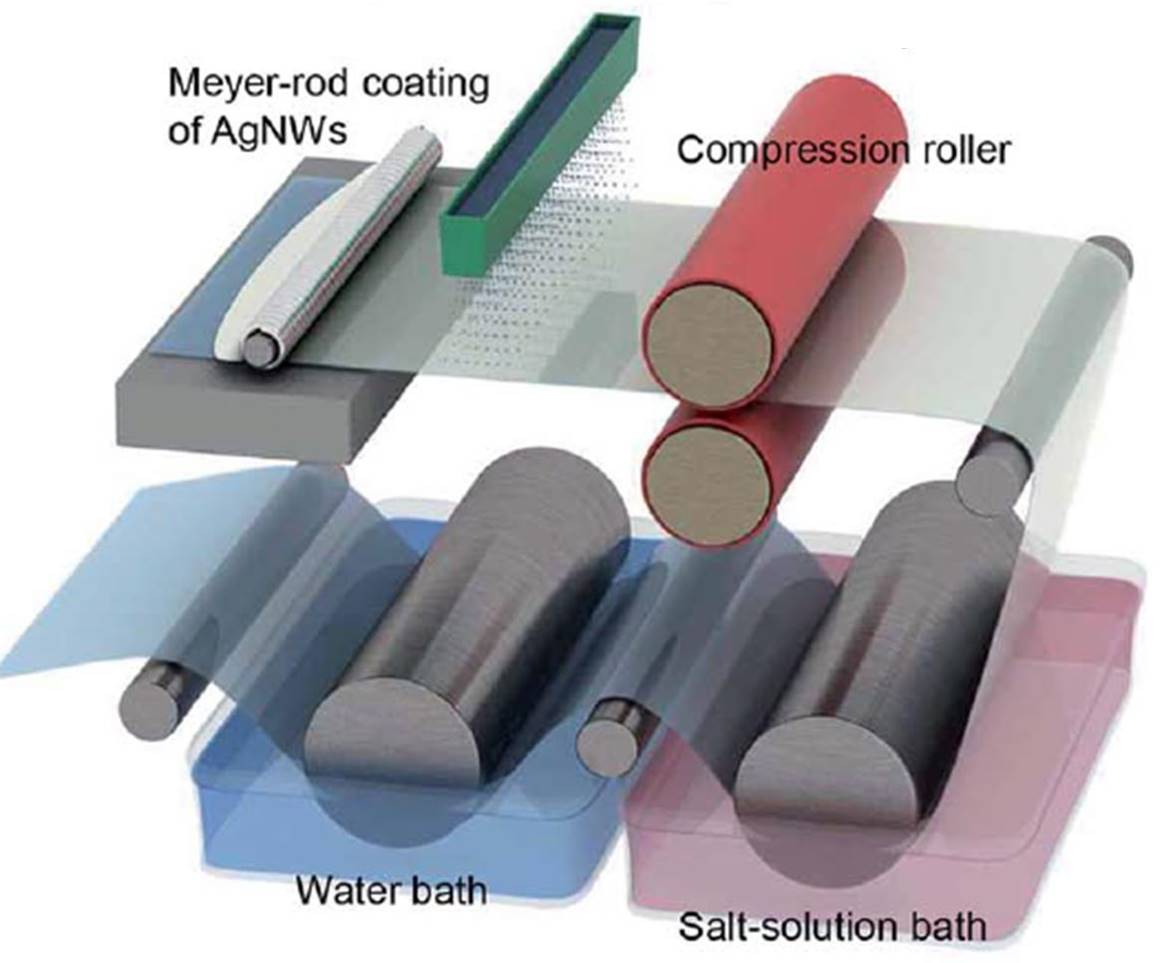
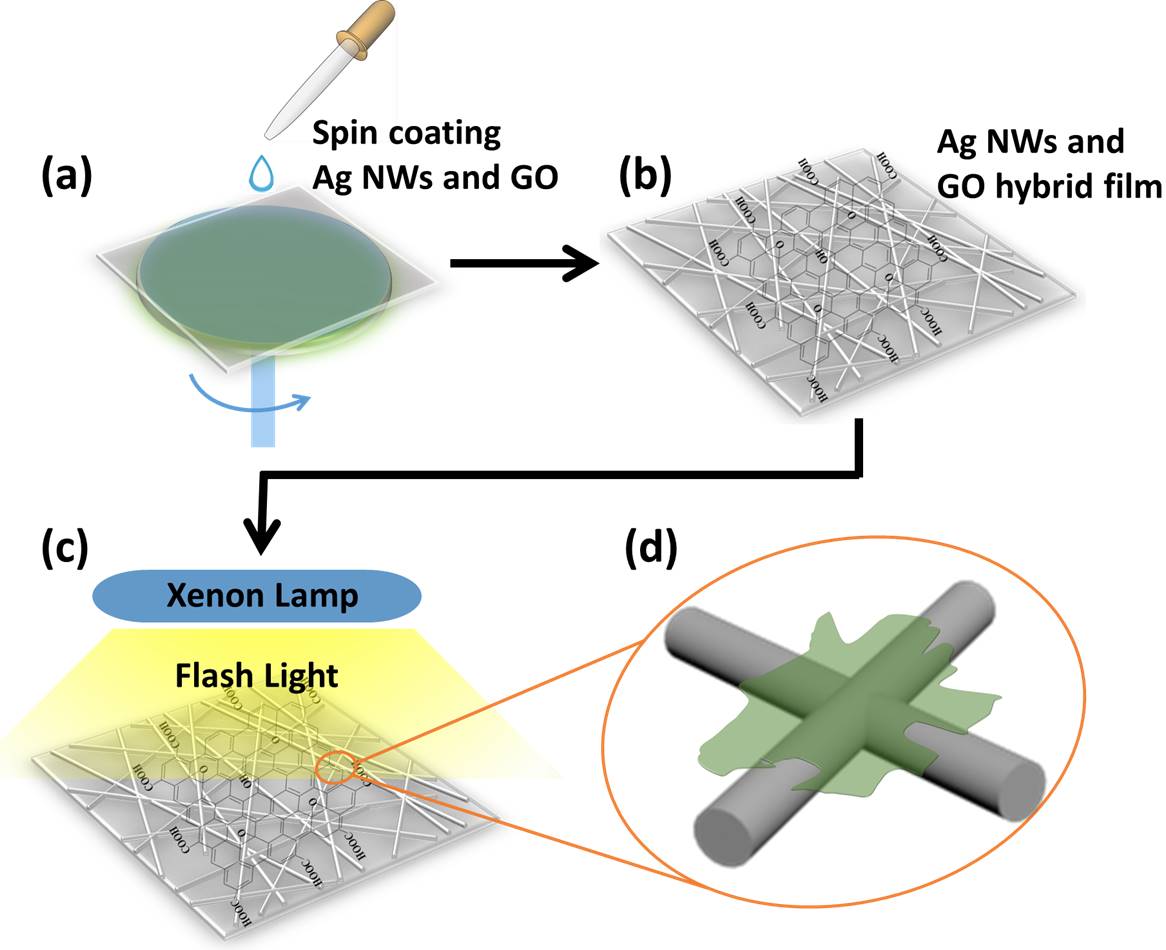

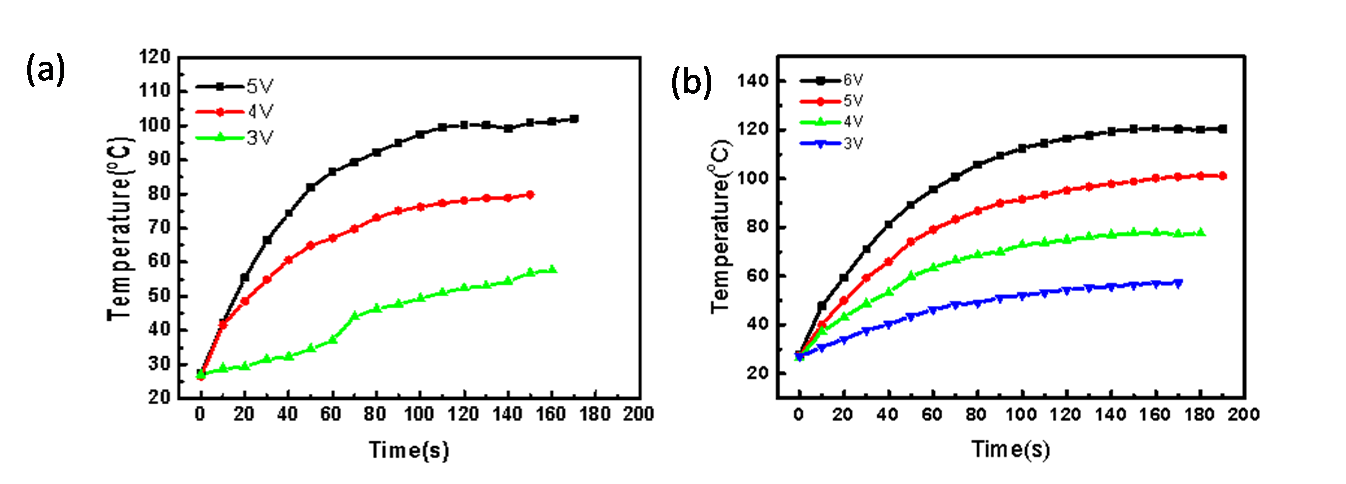
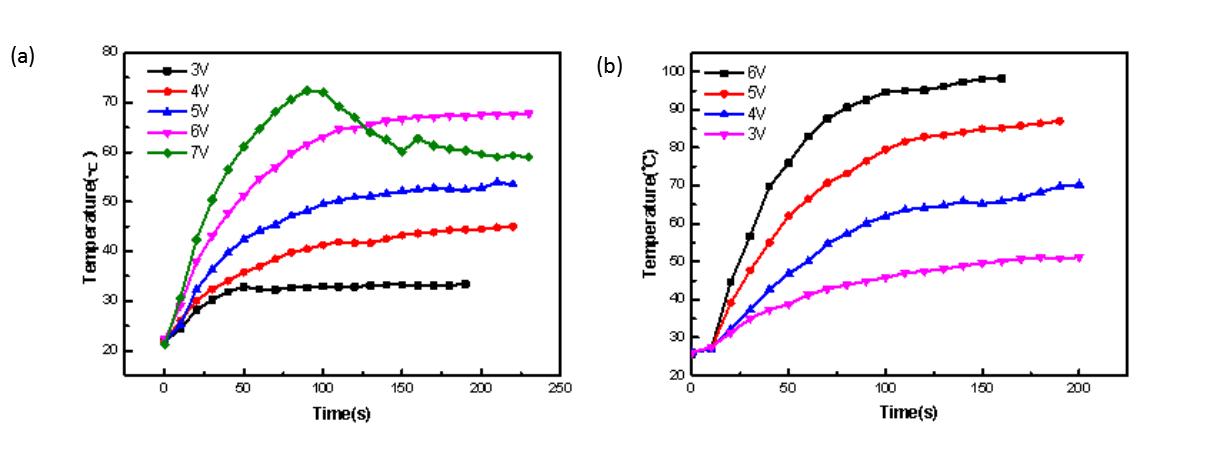
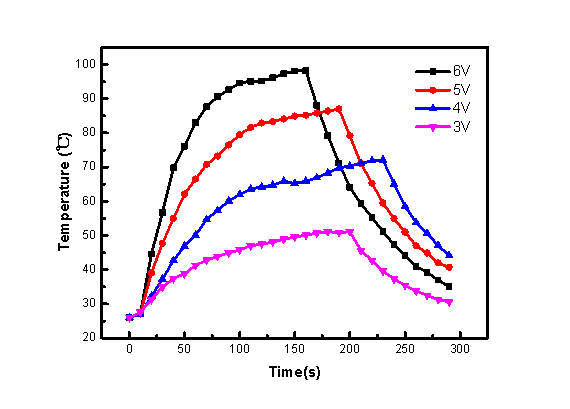
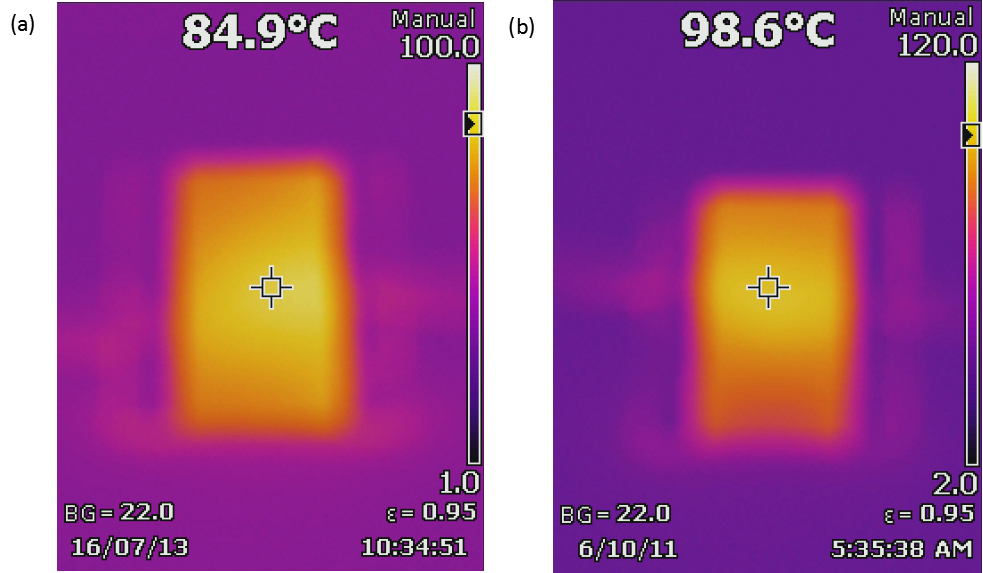
课题毕业论文、开题报告、任务书、外文翻译、程序设计、图纸设计等资料可联系客服协助查找。



